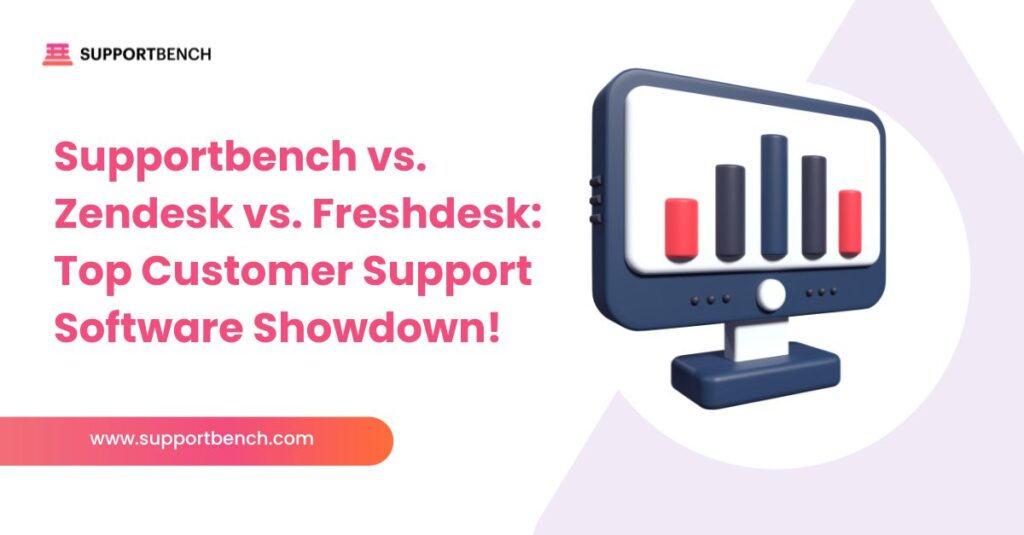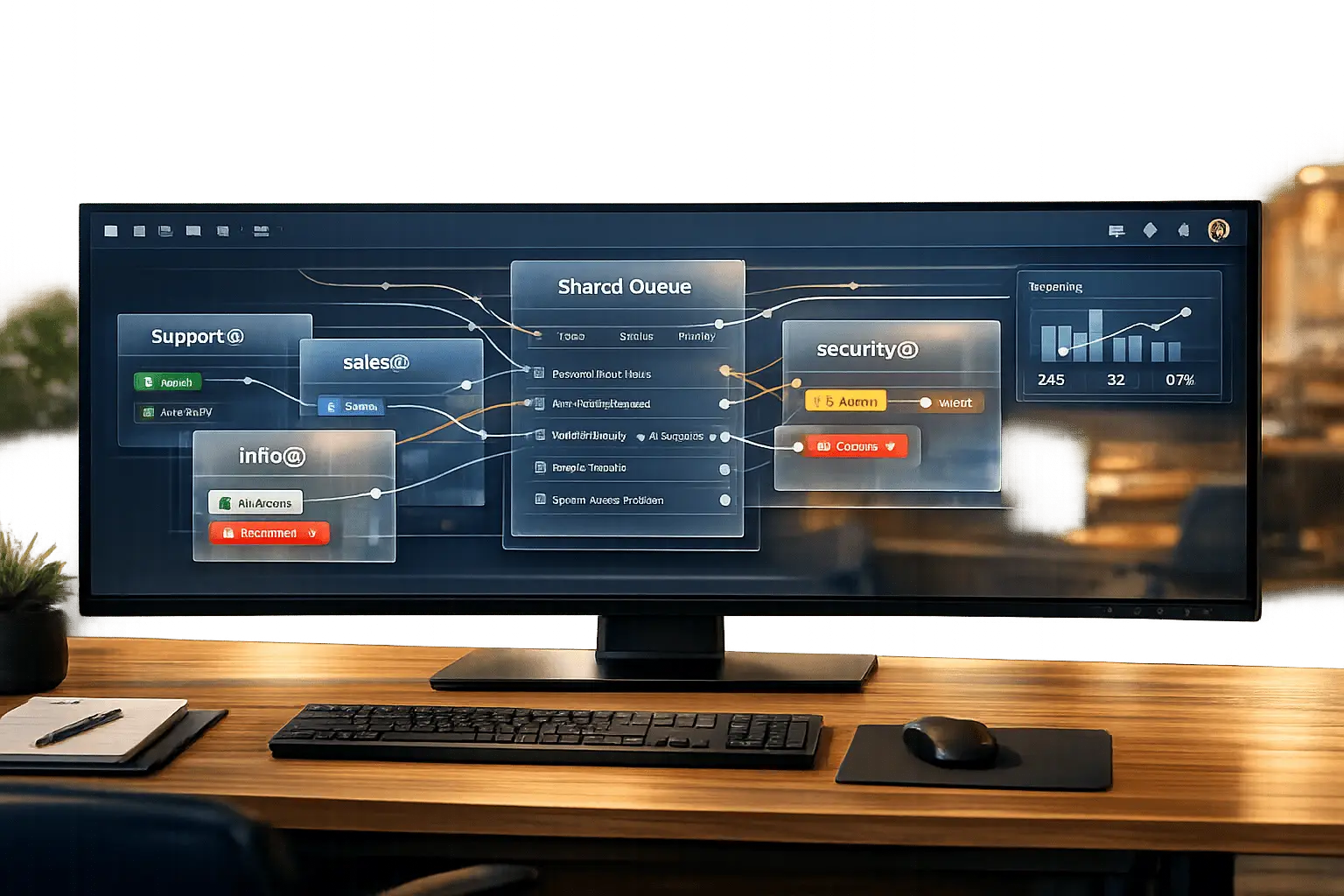Choosing the right customer support platform is not only about features; it is about finding the right fit for your business model, growth stage, and service expectations. Three major players dominate conversations in this space: Zendesk, Freshdesk, and Supportbench.
While each platform provides customer service teams with strong tools, they differ in pricing, scalability, AI capabilities, and flexibility.
The comparison below highlights strengths and limitations for SMBs, enterprises, and B2B SaaS companies. Ultimately, you will have a clear sense of which solution aligns best with your needs.
AI and Automation Capabilities

AI and automation are no longer optional. They determine how well a platform can scale, support, reduce repetitive work, and improve response times.
➤ Zendesk has built-in AI that works best for enterprises with large data sets. It offers predictive intelligence and automated triage, though advanced AI features are locked behind higher pricing tiers.
For teams with big budgets, Zendesk’s AI can handle routine tasks efficiently, but for smaller teams, the cost-to-benefit ratio may be harder to justify.
➤ Freshdesk focuses on straightforward automation. It uses AI tools aimed at small and medium businesses. Features include canned responses, chatbots, and workflow automations.
These make it simple to reduce manual effort. Freshdesk’s AI tools are helpful. They are not as advanced as Zendesk’s predictive intelligence.
➤ Supportbench stands out in AI by providing enterprise-grade automation at all levels. Its platform integrates predictive analytics, sentiment analysis, and SLA-driven workflows. Unlike Zendesk, these features are not gated by expensive add-ons.
For B2B SaaS companies, Supportbench’s AI capabilities are particularly valuable because they help manage complex, long-term customer relationships without adding heavy operational costs.
Pricing Structures
Price often makes the first difference when comparing customer service platforms.
➤ Zendesk operates on a tiered subscription model. At the entry level, pricing seems reasonable, but costs climb quickly as more agents and advanced features are added.
Enterprises with large teams should expect a significant investment. For SMBs, Zendesk often becomes cost-prohibitive.
➤ Freshdesk is the most budget-friendly of the three. Its free plan and low-cost tiers make it appealing for startups and small teams.
However, as businesses scale and require advanced functionality, Freshdesk’s cost advantage narrows, and its limited enterprise tools may hold back larger organizations.
➤ Supportbench uses a transparent and competitive pricing approach. It does not penalize growth in the same way Zendesk does, and it provides enterprise-level features without requiring expensive upgrades.
For businesses in B2B SaaS, where customization and scalability are essential, Supportbench often represents the best long-term value.
Customization and Flexibility

Customization is critical because no two businesses run customer support the same way.
➤ Zendesk allows customization but within a structured framework. Larger enterprises can use APIs and integrations to extend functionality, but adapting Zendesk often requires additional technical resources or consultants.
➤ Freshdesk is easier to set up and customize at a basic level. It works well for SMBs needing straightforward configurations such as ticket categories, automations, and standard reporting. However, deeper customization is limited compared to enterprise-grade platforms.
➤ Supportbench offers the most flexibility. Its design allows businesses to fully adapt workflows, SLA rules, escalation policies, and customer communication models. For companies with complex support environments, this flexibility makes Supportbench especially valuable.
Unlike Zendesk, Supportbench does not restrict key features to premium tiers, making customization accessible from the start.
Scalability
A customer service platform should not only fit your business today but also grow with you.
➤ Zendesk is widely regarded as an enterprise solution because of its ability to scale across thousands of agents and multiple teams. For very large organizations, Zendesk provides proven infrastructure. However, scalability comes with higher costs and complexity.
➤ Freshdesk is best suited for SMBs and smaller teams. It scales reasonably well within that range, but is not built for complex enterprise deployments. As businesses outgrow Freshdesk, they often migrate to more robust platforms.
➤ Supportbench combines enterprise scalability with accessible pricing. It can handle the needs of SMBs while also supporting large, distributed teams.
This adaptability makes it a strong option for businesses planning long-term growth, particularly in the SaaS industry where scaling customer support operations is inevitable.
User Experience and Interface

The usability of a customer service platform can significantly impact team productivity.
➤ Zendesk offers a polished, professional interface. However, it has a steep learning curve, especially for SMBs or teams without dedicated administrators. Enterprise users benefit most from Zendesk’s sophisticated environment.
➤ Freshdesk excels at simplicity. Its clean interface makes onboarding quick, and most teams can get up and running without extensive training. For SMBs that value speed and ease of use, this is a major advantage.
➤ Supportbench balances depth with usability. It provides an interface that supports complex workflows while remaining intuitive enough for new users. This balance makes it suitable for both growing SMBs and large enterprises that require powerful but accessible tools.
Pros and Cons
Every platform has strengths and trade-offs.
Zendesk
Pros: Highly scalable, robust enterprise features, extensive integrations.
Cons: Expensive, steep learning curve, limited flexibility without extra costs.
Freshdesk
Pros: Affordable, easy to use, quick setup for SMBs.
Cons: Limited enterprise features, less advanced AI, scalability challenges.
Supportbench
Pros: Strong AI and automation, flexible customization, enterprise features without premium costs.
Cons: Less brand recognition compared to Zendesk or Freshdesk, requires some onboarding for advanced setups.
Use Cases: Which Platform Fits Best?
Different businesses have different needs; here’s which platform works best for each case.
Small and Medium Businesses (SMBs)
Freshdesk is often the first choice due to affordability and ease of use. However, SMBs planning for significant growth may benefit from starting with Supportbench to avoid migration later.
Large Enterprises
Zendesk remains popular among enterprises with complex operations and the budget to support it. Its scalability is proven, though costs can be high. Supportbench provides an attractive alternative for enterprises seeking flexibility without the high price tag.
B2B SaaS Companies
Supportbench is the strongest option for B2B SaaS. Its combination of AI, scalability, and customization supports the long-term, high-touch relationships common in the SaaS industry.
Comparison Table
Here’s a quick side-by-side look at what each platform offers.
Attribute | Zendesk | Freshdesk | Supportbench |
AI & Automation | Advanced, But Costly | Basic, SMB-Friendly | Enterprise-Grade at All Tiers |
Pricing | High, Scales with Agents | Most Affordable for SMBs | Transparent, Competitive |
Customization | Limited Without Add-Ons | Simple, But Basic | Highly Flexible |
Scalability | Best for Large Enterprises | Suited for SMBs | Scales Across SMBs and Enterprises |
User Experience | Professional, Complex | Simple and Intuitive | Balanced and Accessible |
Conclusion
Zendesk, Freshdesk, and Supportbench each bring strong capabilities, but the right choice depends on your business model. Choose Freshdesk for SMBs, prioritizing cost and simplicity. Choose Zendesk for enterprises with budgets for premium features and advanced scalability.
Choose Supportbench for B2B SaaS companies or growing businesses that need enterprise-level power, flexibility, and AI without excessive cost.
Supportbench stands out in 2025 for providing SMBs and enterprises with a platform that adapts to growth while maintaining accessibility.










